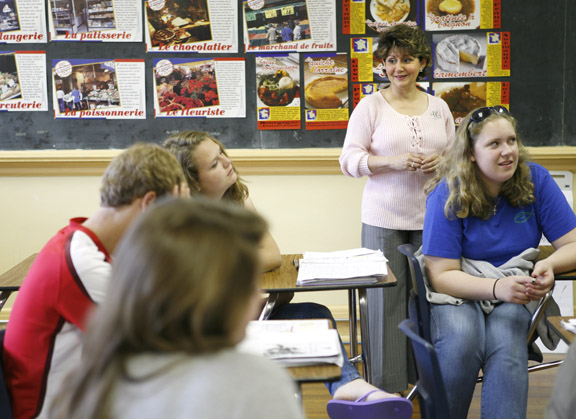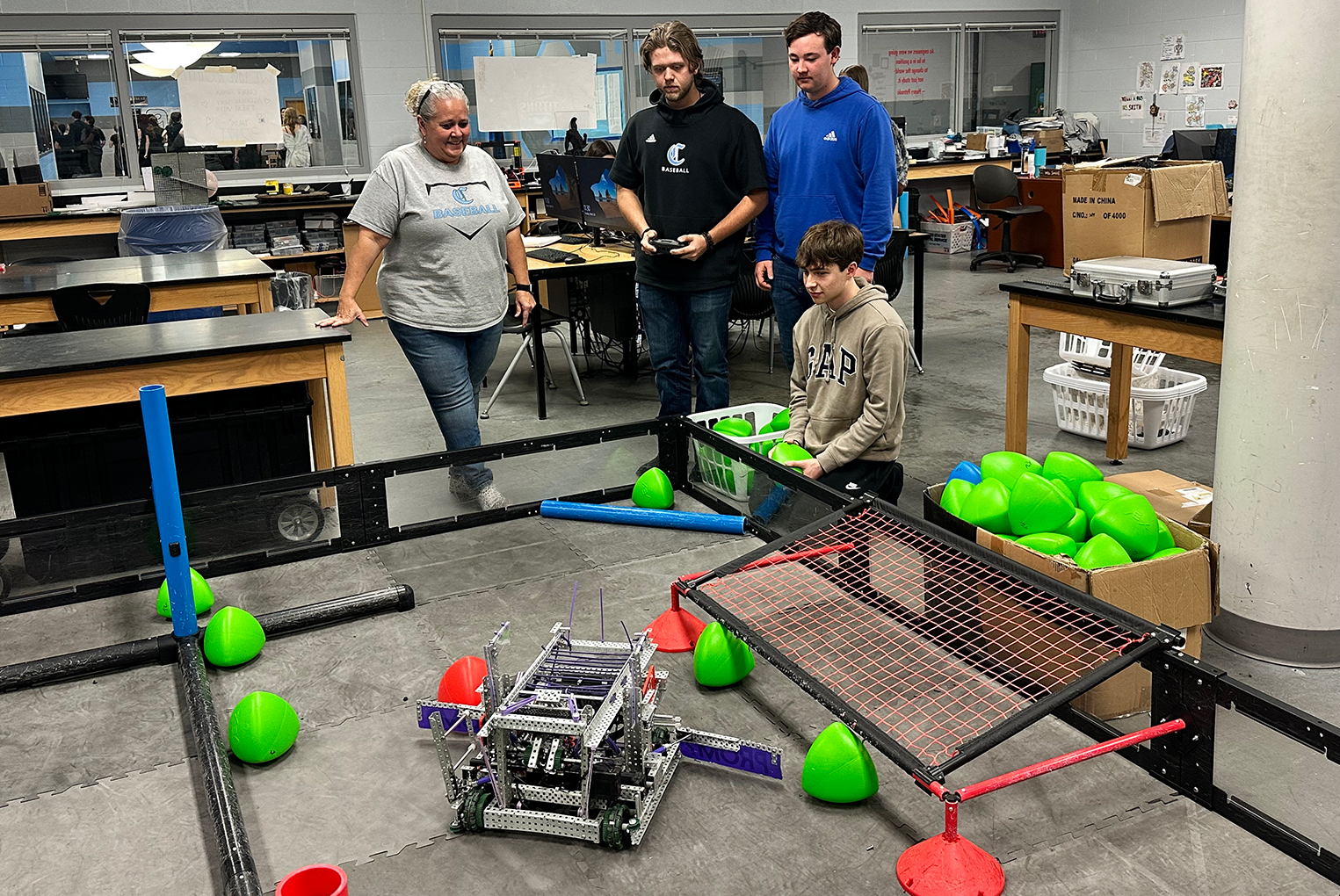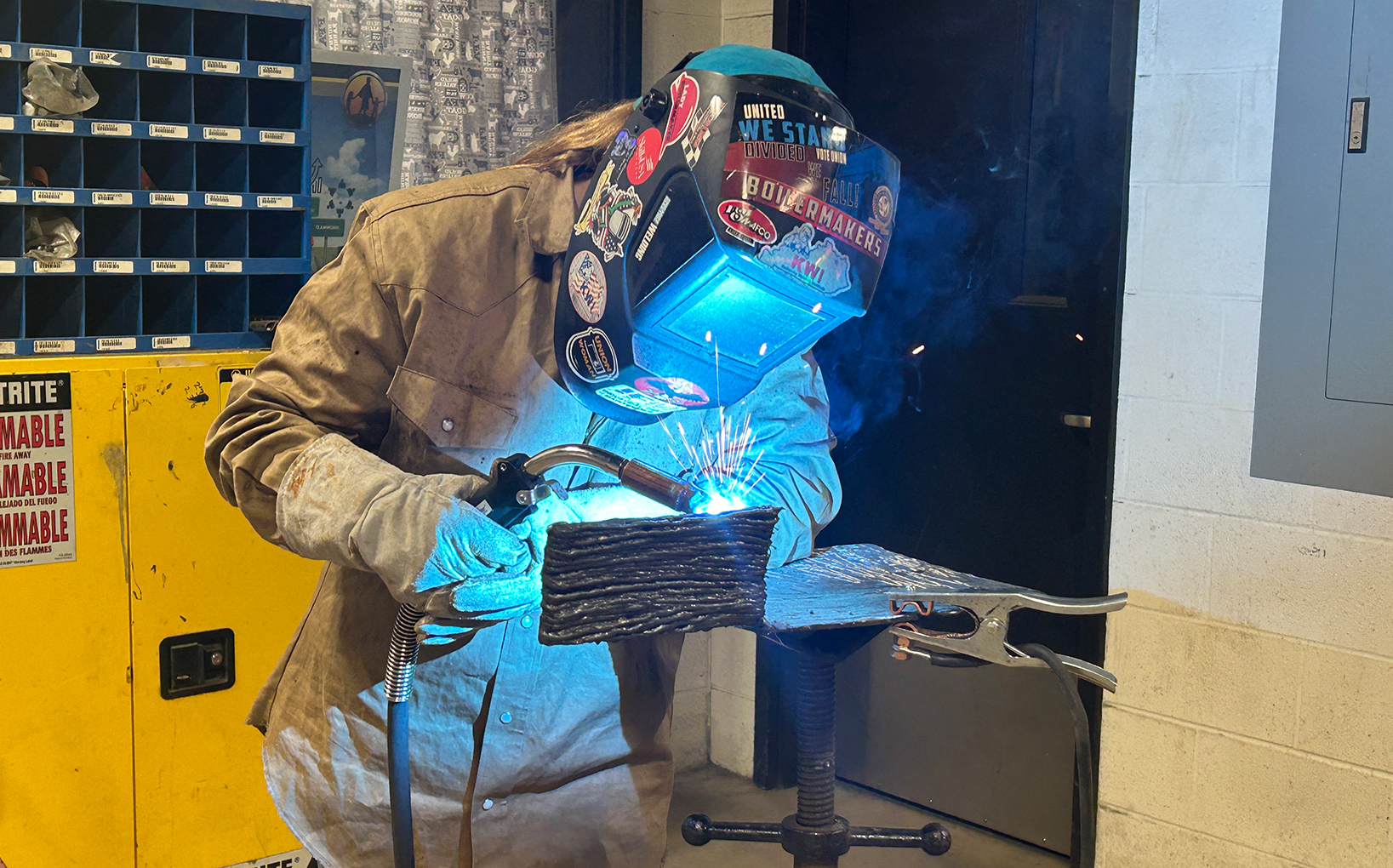
Students listen during Jocelyne A.M. Waddle’s French IV Advanced Placement class at Frankfort High School (Frankfort Independent) May 17, 2010. Waddle, a native of France, is one of several foreign language teachers around the state using the draft world language standards created by the Kentucky World Language Association Teacher Network. Photo by Amy Wallot
By Matthew Tungate
Kentucky students who go to a foreign country are sometimes faced with a significant problem – they can’t ask for food. More specifically, they can’t order the food they want, according to Jacque Van Houten, world language and international education consultant for the Kentucky Department of Education.
That’s because students memorize standard food vocabulary, for instance. However, if “peanut” isn’t one of those words, or the student is allergic, “you were out of luck,” she said.
A student might also know a few meals to order, but what if a restaurant didn’t serve any of those dishes?
“You couldn’t even recognize the other words on the menu,” Van Houten said.
World language educators are starting to take a new approach in Kentucky. Teachers are focusing more on helping students communicate and less on language rules.
“The only way to understand language proficiency is by performance,” Van Houten said. “No one ever asks you to conjugate a verb on the street in Paris.”
Some teachers want students to learn every grammar point from the beginning and then use the language.
“We’re giving you, ‘Use the language, and let’s refine the use of the grammar techniques later on,’” Van Houten said. “It’s motivating. It makes kids want to continue to study the language because they see they have a purpose for it.”
Kentucky offers a variety of world languages (American Sign Language, Mandarin Chinese, French, German, Hebrew, Japanese, Latin, Russian, Spanish, and Spanish for Spanish students), and at multiple levels (preschool, primary, intermediate, middle and high school) depending upon the school and school district. Kentucky requires two units of the same world language for pre-college curriculum.
The Kentucky World Language Association (KWLA) Teacher Network has spent two years developing new standards, which will be presented to the Kentucky Board of Education after they have had more field testing, Van Houten said.
The new plan has one standard with learning indicators and learner benchmarks. Students have six competencies (three language, three intercultural). Language competencies reflect modes of communication (interpersonal, interpretive and presentational). Intercultural competencies reflect whether a speaker uses language in the appropriate cultural context.
“This is interplay – a person dealing with another person, using language written or spoken, and understanding their culture and your culture enough that you’re able to negotiate meaning,” Van Houten said.
Competencies are based on “I can” statements, such as “I can understand some short conversations or descriptions.” Students are evaluated as intermediate, advanced or superior.
Jocelyne A.M. Waddle, a native of France, teaches numerous world language courses at Frankfort High School (Frankfort Independent). She is vice president of the state’s American Association of Teachers of French (AATF).
In her classroom, she has five posters with “I” statements on them. They are:
- I am very comfortable with…
- I can…
- I would like to know more about…
- With a little bit of help I can…
- I don’t have a clue about…
“As I go through the unit, students are encouraged to check their progress by putting Post-It notes in the appropriate poster and changing them as their confidence and proficiency improve,” she said.
Waddle said she recently began using the draft world language standards to help create assessments.
“Performance assessments allow students to truly see their present language abilities within any given function,” she said. “They become very excited when they realize that they actually can tell someone all about their friends and family, can order a meal in a restaurant, can tell someone about a recent trip they went on and more.”
Alice Spagnola is in her first year teaching Spanish at Fairdale High School (Jefferson County) after spending the most recent five years at Fern Creek Traditional High School (Jefferson County). She has spent more than a year helping the Jefferson County school district revamp its world language program.
She said many of students have had previous experience in a Spanish classroom, often negative, when they come to her.
For instance, last year two students were taking an interpersonal speaking test with each other. “Joe” asked “Allen” a question, and “Allen” didn’t understand. “Joe” restated the question in a different way to explain what he meant and to help “Allen,” thus keeping the conversation going, Spagnola said.
“This may not sound like much, but this requires a higher level of proficiency than I expected to hear and, for this assessment, ‘Joe’ received an exceeds expectations,” she said. “He was so excited he put the rubric with his grade on the refrigerator (that normally has nothing on it). He didn’t tell me – his mother did. He was excited about his success in the second language.”
Students decide quickly in a language classroom whether they feel like they can do well or not, said state AATF President Tiffany Hornback, a fourth-year French teacher at Campbell County High School.
“Doing my best to encourage them to find their own intrinsic motivation, many of my students have grown to see learning their second language as much more than simply obtaining a required education credit,” she said.
Hornback said students have a lot of fun practicing the language together each day, communicating with teen pen pals in France, traveling and “just seeing that learning another language is truly possible for anyone.”
She said students also see the benefits of learning another language: being more competitive for colleges or employers; having opportunities to study abroad and experience other cultures; or becoming a citizen in today’s global society.
“At 26 years old, I have studied abroad twice; taught English in Caen, France, for a year; have traveled to Europe approximately 10 times; have great friends all over the world that I can communicate with and visit; and have a great career as a language teacher, which continues to provide me with awesome opportunities,” Hornback said. “I have experienced all of this because I enrolled in French as a high school freshman and continued to move forward with my language learning.”
MORE INFO …
Jacque Van Houten, jacqueline.vanhouten@education.ky.gov, (502) 564-2106



Leave A Comment